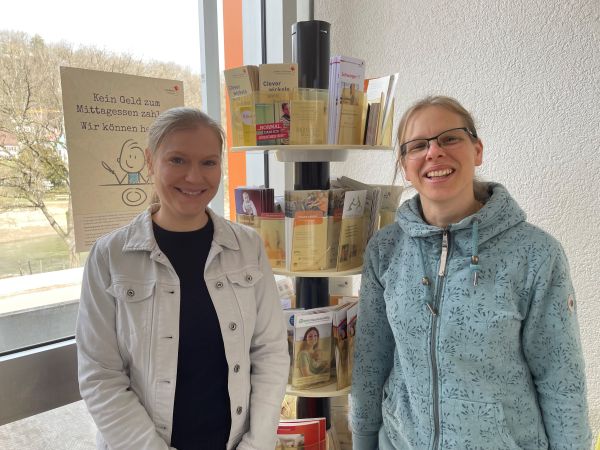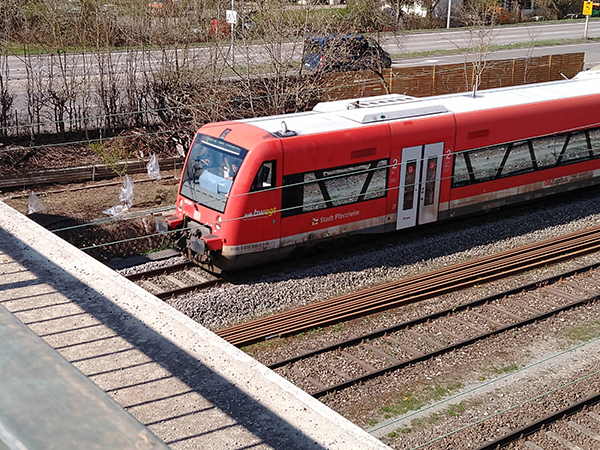By Ute Kaiser
Becoming and being a parent is challenging—especially when your family lives far away. What to do when the baby is constantly crying? What if there’s not enough breast milk? Do we handle the ventilator correctly with premature babies? Why does the second child speak much later than the older brother? What is the best way to support our child with a disability? Or: How can we manage the stressful everyday life as a couple?
Questions like these unsettle parents of children between the ages of 0 and 3. Support is provided by a team of social education workers, psychologists, pediatric nurses and midwives from “Early Help” at the Youth and Family Counseling Center (JFBZ) for the district of Tübingen. Referrals are made at the youth and family advice centers in Tübingen, Mössingen and Rottenburg. One focus of “Early Help” is health-oriented family support—also for refugees.
Voluntary, free and confidential support specifically for refugee families is available at seven locations in the district: in Ammerbuch, in the city of Tübingen in Sidlerstraße, Hechinger Straße, Breiter Weg, Horemer, in the initial reception center and in Rottenburg in Hammerwasen. The most intensive need for advice with the highest number of referrals to suitable services is in temporary accommodation. This is reported by Kathrin Bischoff, a qualified educationalist and coordinator of “Early Help” at the district office. Like family, health and pediatric nurse Elisa Wolff-Rutkowski, she is aware of the problems faced by refugees: social stress, lack of language skills, the difficulty of navigating a foreign cultural and healthcare system with many medical check-ups, especially for children, existential fears and unclear prospects of staying.
Elisa Wolff-Rutkowski holds open parent consultation hours in the accommodation centers, among other things. She is also trained in culturally sensitive counseling. If there are language difficulties, she can request translators via Caritas. For some less sensitive issues, a person from the family’s environment can also take on this task.
“Early help” means that support is offered as quickly as possible so that difficulties do not become greater and supposedly unsolvable. The money for this comes from a foundation and the Ministry of Family Affairs in Berlin.
There is one goal that unites all “early help” staff: “The child should be well,” says Elisa Wolff-Rutkowski. This is not (always) easy. “Many parents have a lot of self-doubt,” Kathrin Bischoff knows from experience. Elisa Wolff-Rutkowski experiences this time and again during her visits to families’ homes: “Some have high expectations of themselves as parents and overextend themselves.”
Up to a maximum of four hours per week are set aside for visits to the family until the child is three years old. Topics such as health, child development, parenting, coping with everyday life, but also the parents’ care for themselves can be discussed. The pediatric nurse explains, for example, that a child should not be bathed too hot to prevent skin damage. Family midwives can also be deployed in the first year of the child’s life. They support expectant parents during pregnancy so that they are well prepared for the birth and the baby. The health professionals advise parents if breastfeeding is not successful, the baby cries a lot or sleeps little.
According to Katrin Bischoff’s experience, medical professionals in particular “enjoy a level of trust and find it easier to access families”. Their advice is therefore more likely to be accepted. They can also act as guides in the medical system for parents of a child with an (impending) disability or chronic illness and, for example, organize the first visit to the paediatrician.
Some babies need expensive food from the pharmacy. In this case, the specialists from “Early Help” provide support with applications for care allowances. And they also keep an eye on the welfare of siblings. Depending on their needs, they can arrange suitable support services for them.
Specialists such as Elisa Wolff-Rutkowski experience the families in their everyday lives and see what specific help they need—for example with childcare, in financial and psychological crises, in the household from external specialists or relatives. If the preventative “early help” is not enough and more intensive support is needed, they also establish contact with other support services.
In the initial reception center, the “Early Help” service reached 75 families in 2023. According to internal statistics, 80 families were supported in the other accommodation centers during the same period. In total, the “Frühe Hilfen” staff advised 376 families last year, of which Elisa Wolff-Rutkowski alone advised 155 families in her open parent consultation hours.
You can contact the “Early Help” service in Tübingen at the Youth and Family Advice Center (JFBZ), Bismarckstraße 110, by calling 07071 / 207 63 03 or sending an email to JFBZ-Tue@kreis-tuebingen.de at the JFBZ Mössingen, Bahnhofstraße 5, by calling 07071 / 207 63 33 or sending an email to JFBZ-Moe@kreis-tuebingen.de and at the JFBZ Rottenburg, Obere Gasse 31, by calling 07071 / 207 63 63 or sending an email to JFBZ-Rbg@kreis-tuebingen.de.
tun24032002
Die Familien, Gesundheits- und Kinderkrankenpflegerin Elisa Wolff-Rutkowski (links) und die Diplom-Pädagogin Kathrin Bischoff vom Team der „Frühen Hilfen“ im Jugend- und Familienberatungszentrum Tübingen beraten und unterstützen Eltern von Kindern zwischen 0 und 3 Jahren in allen für sie wichtigen Fragen. Foto: tünews INTERNATIONAL / Ute Kaiser.
002343




